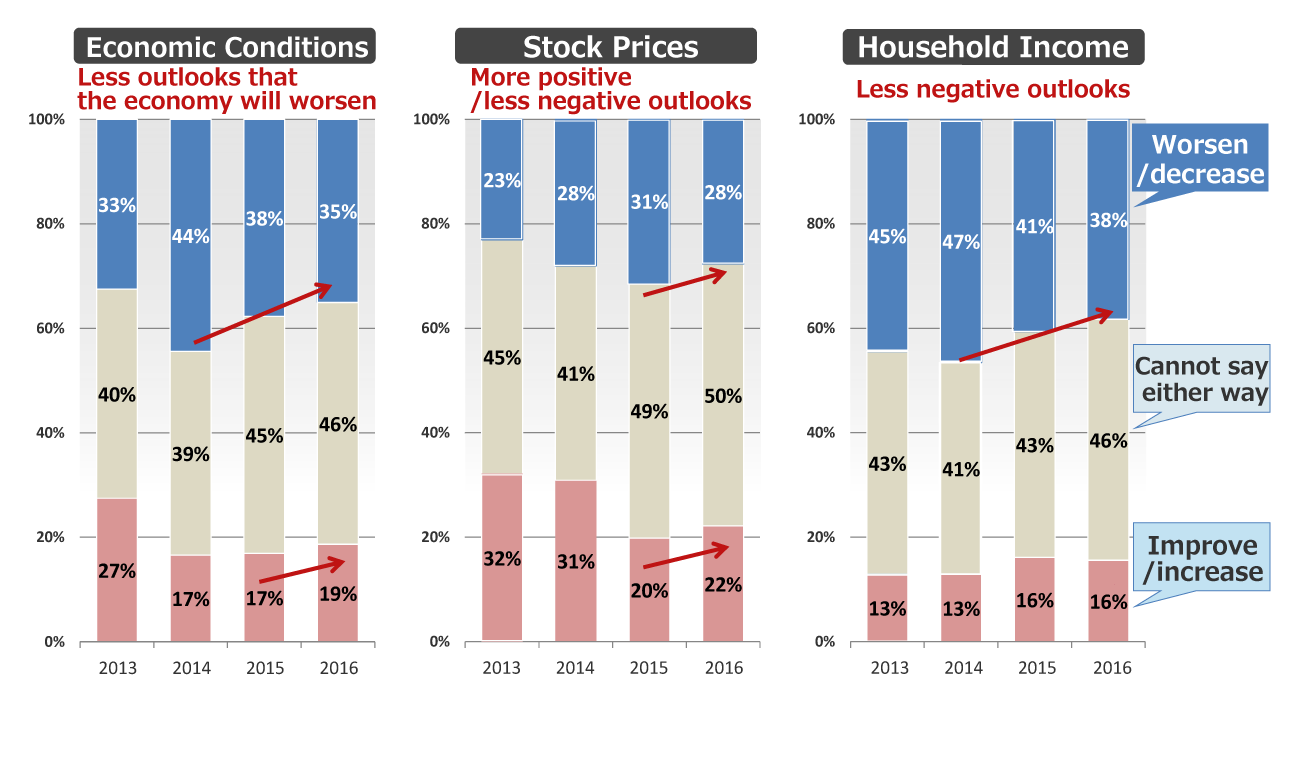
Four Years of Change as Seen from NRI’s “Year-End Consumer Internet Survey”
At the end of 2016, NRI conducted its fourth “NRI Year-End Consumer Internet Survey”, which the company has carried out each year since 2013. The Survey collected and analyzed responses from 3,000 men and women between the ages of 15 and 69 across Japan. The results of the survey are summarized here based on the theme “Four Years of Change as Seen from NRI’s ‘Year-End Consumer Internet Survey’—Expectations and Uncertainties in an Advanced Digital Society”.
There’s a sense of “real” economic recovery. There’s also a consumer trend of spending more on activities than on products
It has been exactly four years since “Abenomics” was put into motion. At the start of a new year, how do consumers really feel about the economic recovery, and how have consumer trends changed?
The number of persons who believe the economy will worsen going forward is on the decline. While expectations concerning the economic turnaround were at their highest at the end of 2013, from 2015 onward there have been greater signs of optimism regarding both the economy and personal incomes. More and more people cited the increases in their monthly salaries and bonuses as the reason they feel that the economy is picking up.
As for changes in consumer trends, growing numbers of people are now less interested in using their money to purchase products and more inclined to spend it on experiences, including on travel, hobbies and recreational activities, education and studies, and entertainment expenses.
Changes in Outlook Regarding the Economy, Stock Prices, and Household Income from Year to Yea

Information searches using SNS etc. place more importance on “immediacy”, “honest opinions”, and “fun” than on “credibility”
The survey revealed that information searches using SNS and similar methods are most heavily used by younger people, who tend to value “immediacy”, “honest opinions”, and “fun” rather than the credibility of the information itself. Furthermore, people tend to have a positive view towards disclosing their personal information through SNS etc. depending on what sort of benefits they can obtain in exchange. However, the results indicated that more people now hold a negative view about their personal information being bought and sold for any business services.
Respondents’ familiarity with or experience using robots and artificial intelligence (AI) was still too limited for them to say whether they held a favorable or unfavorable opinion about these topics.
Respondents feel pride in Japan, but are worried about the future
The survey showed that young people in particular are increasingly likely to feel a sense of pride in Japan. Those who had a positive image of Japan cited “public safety”, “cuisine”, and “level of hygiene and cleanliness” as their top reasons. However, 60% of those who answered said they were concerned about Japan’s future. The factors causing them to hold a negative perception included the “declining birthrate and aging population”, “natural disasters”, and “long work hours”.
Although levels of satisfaction with daily life have recently been on the rise, the survey also showed a tendency to have a comparatively low sense of life fulfillment. A certain percentage of people responded that they were generally satisfied despite not feeling a clear sense of fulfillment, yet young people registered higher levels of satisfaction and fulfillment than older generations.